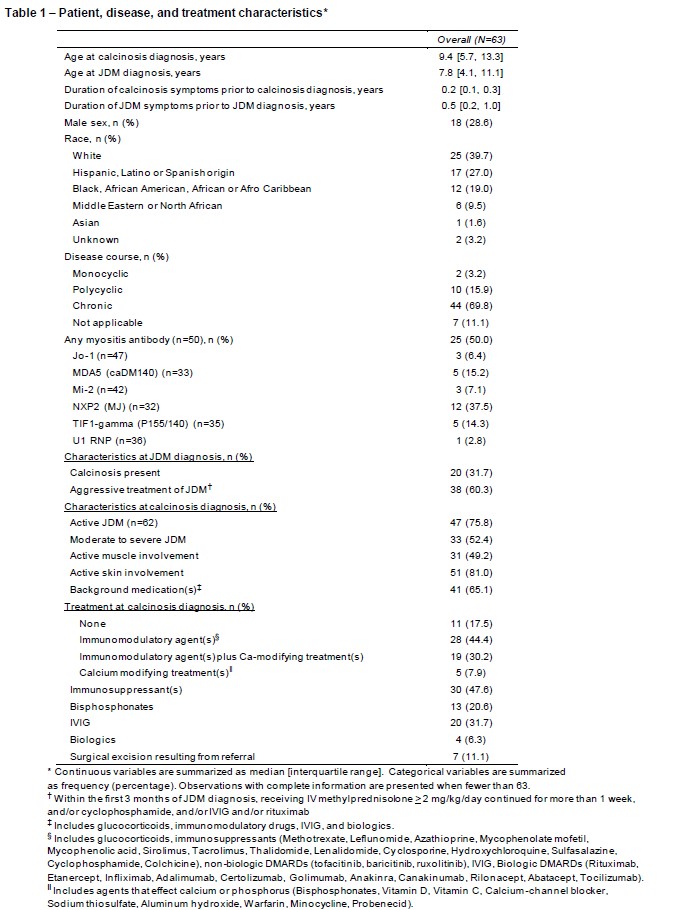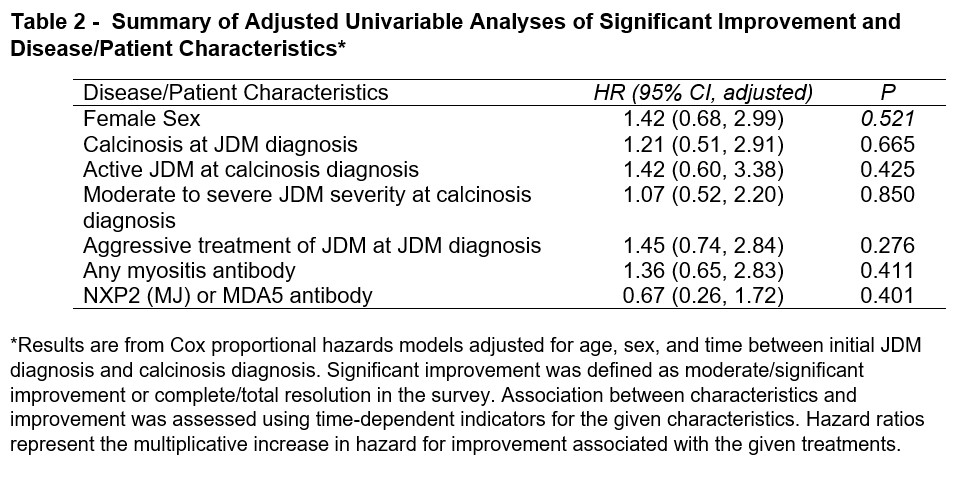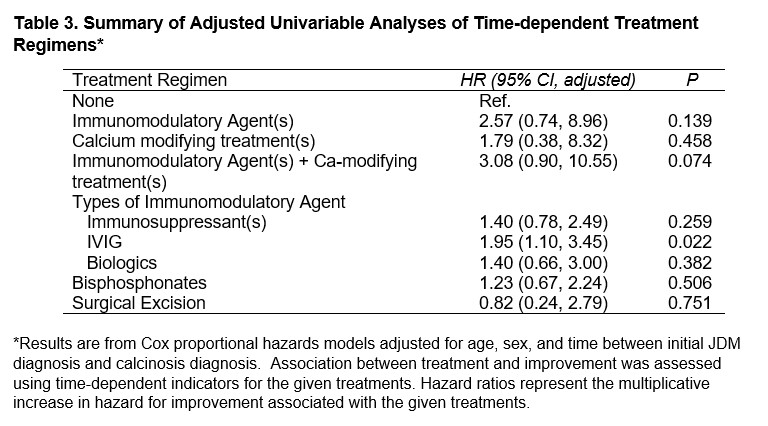Session Information
Date: Monday, November 13, 2023
Title: (1221–1255) Pediatric Rheumatology – Clinical Poster II: Connective Tissue Disease
Session Type: Poster Session B
Session Time: 9:00AM-11:00AM
Background/Purpose: Calcinosis is a poorly understood and morbid complication of juvenile dermatomyositis (JDM). As there is no consensus treatment approach for calcinosis, and limited knowledge of outcomes, we seek to inform future treatment guidance for this significant complication of JDM. We performed a multi-institutional retrospective review of treated cases of JDM calcinosis to assess outcomes as they relate to JDM severity, myositis autoantibody, initial treatment, and calcinosis-directed treatment.
Methods: Collaborators of Childhood Arthritis and Rheumatology Research Alliance (CARRA) submitted retrospectively reviewed cases with data collected at timepoints of JDM and calcinosis diagnoses, respectively, as well as the determined outcome of each specific calcinosis treatment.All cases were sourced from electronic health record searches of clinical terms or billing codes. Only cases diagnosed and treated from 2003 to 2019 were included to capture the contemporary era of JDM treatment. Cases were required to have probable/definitive JDM by Bohan and Peter criteria and calcinosis. Outcome was assessed in univariable and multivariable analyses as time to improvement by clinician judgement utilizing all available follow-up. Proportion with improvement along with 95% confidence intervals was estimated using Kaplan-Meier analysis. Multivariable Cox models were used to assess the association between patient characteristics and time to improvement beginning at calcinosis diagnosis.
Results: Data for 63 patients were collected from 11 institutions. Median age was 7.8 years at JDM diagnosis and 9.4 years at calcinosis diagnosis. Calcinosis was present at JDM diagnosis in 32%. JDM was considered active in 76% of cases at the time of calcinosis diagnosis. Fifty percent of patients had a positive myositis autoantibody, with anti-nuclear matrix protein 2 (NXP2) antibody being the most common (38%) (Table 1). The presence of NXP2 or anti-melanoma differentiation-associated gene 5 (MDA5) antibodies did not reach statistical significance to influence outcomes but trended to lower likelihood of improvement (Table 2). Patients received multiple treatment regimens including immunomodulating agents with or without other calcium modifying treatments. Seventy nine percent of patients ultimately showed improvement. IVIG was associated with greater probability of calcinosis improvement (p=0.02) compared to treatment without IVIG (Table 3). The improvement was largely determined based on history and physical exam (93%), whereas imaging was used in a small number of cases (14%).
Conclusion: NXP2 antibody was the most common myositis antibody in our JDM calcinosis population. Those with NXP2/MDA5 antibody were less likely to respond to treatment, although not statistically significant. Our cohort received multiple treatment regimens including both immunomodulating therapies and calcium modifying agents. Reassuringly, most patients showed improvement over time, especially with IVIG; however standardized measures of defining improvement are warranted. Improved knowledge of treatment choices and outcomes can support future prospective studies.
To cite this abstract in AMA style:
Yi B, Wahezi D, Covert L, Ardalan K, Hui-Yuen J, Vasquez Canizares N, Mosad Mosa D, Jones M, Correll C, Begezda A, Shenoi S, Wu E, Kovalick L, Lapin W, Tarvin S, Oliver M, Rodriguez M, Marmor I, Baszis K, Taxter A, Hanson A, Crowson C, Orandi A. Assessment and Outcomes of 63 Cases of Juvenile Dermatomyositis-Associated Calcinosis [abstract]. Arthritis Rheumatol. 2023; 75 (suppl 9). https://acrabstracts.org/abstract/assessment-and-outcomes-of-63-cases-of-juvenile-dermatomyositis-associated-calcinosis/. Accessed .« Back to ACR Convergence 2023
ACR Meeting Abstracts - https://acrabstracts.org/abstract/assessment-and-outcomes-of-63-cases-of-juvenile-dermatomyositis-associated-calcinosis/



